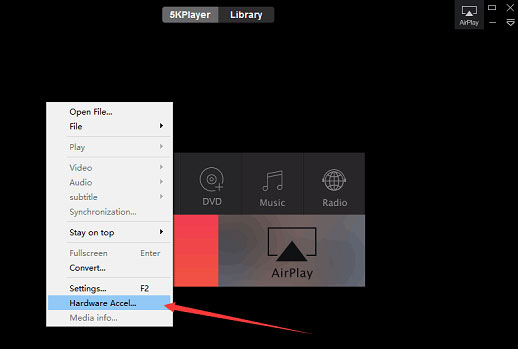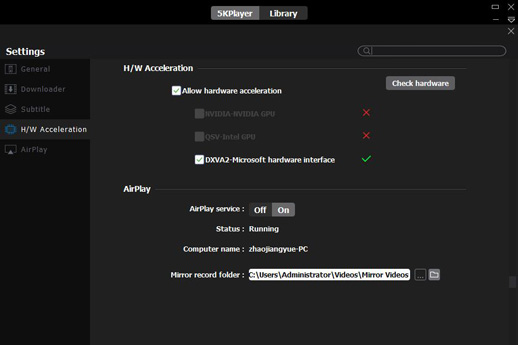
Optimize Windows 10: Activate Hardware-Accelerated Decoding with 5K Player

Optimize Windows 10: Activate Hardware-Accelerated Decoding with 5K Player
5KPlayer > Video Music Player > 5KPlayer Hardware Decoding
Disclaimer: This post includes affiliate links
If you click on a link and make a purchase, I may receive a commission at no extra cost to you.
5KPlayer Hardware Decoding on Windows 10
Posted by Kaylee Wood | Last update: April 28, 2020
What Is Hardware Decoding? For multimedia players, hardware decoding is an efficient way to manipulate specific chip to assist video/audio decoding and rendering process to present the video in a better and faster way. 5KPlayer hardware decoding comes down as this.
Difference between HW Decoding and SW Decoding
GPUs descended from 3D accelerators used to render 3D graphics. The term GPU was coined by NVIDIA upon the launch of GeForce video chips. The general purpose of GPU was to relieve the Central Processing Unit (CPU) of graphics-related tasks to ensure efficient workload.
Briefly speaking, hardware decoding divides the processing burden from CPU to GPU. It activates graphic processing unit to precisely decode video files instead of using CPU in general; while software decoding only uses CPU and software itself to handle all those data, which can be very slow and laggy, especially while you are online shopping or doing other CPU consuming activities and wishing to play an ultra high-definition video at the same time. Software decoding would be a struggle. In conclusion, H/W decoder is using these chipsets to play videos whereas S/W decoder only uses CPU to play them.
When Do You Need HW Decoding?
Hardware decoding is generally to help reallocate the processing power to help reduce CPU overheating and improve overall functionality and speed. Especially when you are about to playback large video files like H.265 4K 8K 10bit videos or your CPU is heavily occupied already, for hassle-free glitches-free visuals, we highly recommend you enabling HW decoding to relief the pressure.
5KPlayer Hardware Acceleration and 5KPlayer AirPlay Hardware Decoding
5KPlayer now offers users three hardware decoding options: QSV-Intel, NVIDIA CUVID and DirectX Video Acceleration (DXVA).
QSV decodes on Sandybridge, for instance, cannot do ~29.x fps decode properly, failing with a green smudge for MPEG-4, VC-1 and H.264 content. QuickSync does not offer any benefits. It is also no longer being developed and does not support HEVC.
NVIDIA CUDA (Compute Unified Device Architecture), is NVIDIA’s technology. The complex computing tasks are partially asigned to GPU resources via a special API provided by Nvidia. CUDA works only with NVIDIA graphics cards, starting with GeForce 8 series and later.
DXVA (DirectX Video Acceleration) is a Microsoft API specification for the Microsoft Windows and Xbox 360 platforms that allows video decoding to be hardware accelerated. DXVA works with almost all graphics cards.
These two are what 5KPlayer uses to expedite the whole process of 4K H264 video decoding , H265 to H264 conversion , video to MP3 download conversion, to WebM download conversion, to 3GP download conversion, to AAC download conversion,to M4A, and of course AirPlay streaming.
In terms of hardware acceleration, it is basically the same for both video playback and AirPlay as to minimize the occupation of CPU and speed up the decoding process. Once you turn on the hardware decoding option, generally most of the graphic instructions will be dealt with GPU in a separate and smoothier manner instead of occupying CPU.
Choosing between QSV, NVIDIA and DXVA:
1. Your Intel GPU will be used by default if you use DXVA2.
2. If you want to use your NVIDIA GPU you need to adjust the NVIDIA settings. (Do that with a third party tool called “NVIDIA Profile Inspector”)
3. NVIDIA only supports H.264 decoding while DXVA supports H.264, MPEG2, VC-1.
Summery: According to LAV Filters author, CUVID and Intel QuickSync are outdated. DXVA is much more engery efficient and time-saving than NVIDIA CUDA when you choose to use one of them only. The thing is, you can enable and use both NVIDIA CUDA and DXVA to decode videos in an even faster manner!
How to Enable HW Acceleration in 5KPlayer?
Step 1: Download 5KPlayer and install it
Step 2: Launch 5KPlayer and right click on 5KPlayer main UI
Step 3: Click Hardware acceleration to manually enable HW decoding in 5KPlayer.

Step 4: Click Allow hardware acceleration and check hardware.
Note: At present, 5KPlayer supports QSV, NVIDIA CUDA and DXVA GPU acceleration, check whichever one your computer supports.
Also note that if you still can’t find the Hardware Acceleration option in “Right Click”, make sure your 5KPlayer is upgraded to the latest version!

Enable 5KPlayer hardware decoding to unleash the horse power for FUHD video rendering utility to play HEVC Windows 10 and faster video format conversions! 3D 360 degree VR videos, Bluray 4K videos, HDR 4K movies can all be handled easily here. Download 5KPlayer here now!
Also read:
- [New] 2024 Approved The Latest on YouTube Ad Income Guidelines
- [Updated] 2024 Approved Savory Streams The Best Food Channels to Watch
- [Updated] 2024 Approved Sculpting Waterway Content with Flair
- [Updated] Beauty Vlogs From Basics to Brilliance Launching a YouTube Channel
- [Updated] SRT File Accessibility Across Computers for 2024
- Download Premium, Free Torrent Software for High-Quality Movie Streaming
- Führende Open-Source MOV Videoplayer – Professionelle Anleitungen Zum Abspielen Von Filmen Unter Windows & Mac OS X
- Joke Makers' Haven - Get It Today
- Leading 4 Successors of Windows Media Center in Windows 10 Era
- Mastering Multimedia: Step-by-Step Tutorial for Embedding Text in MP4/MKV/AVI Videos
- New In 2024, WebM to MP3 Expert-Recommended Conversion Solutions
- Recovering Internet Router Settings on Windows PC
- Top Rated Free Windows 11 Media Player: Enjoy Unlimited Entertainment
- Ultimate Free AAC Software for Superior Sound Experience - Effortlessly Enjoy AAC Songs & Podcasts
- Title: Optimize Windows 10: Activate Hardware-Accelerated Decoding with 5K Player
- Author: Emma
- Created at : 2025-02-15 16:58:49
- Updated at : 2025-02-19 17:04:11
- Link: https://video-ai-editor.techidaily.com/optimize-windows-10-activate-hardware-accelerated-decoding-with-5k-player/
- License: This work is licensed under CC BY-NC-SA 4.0.

